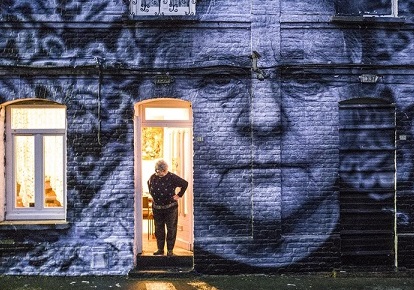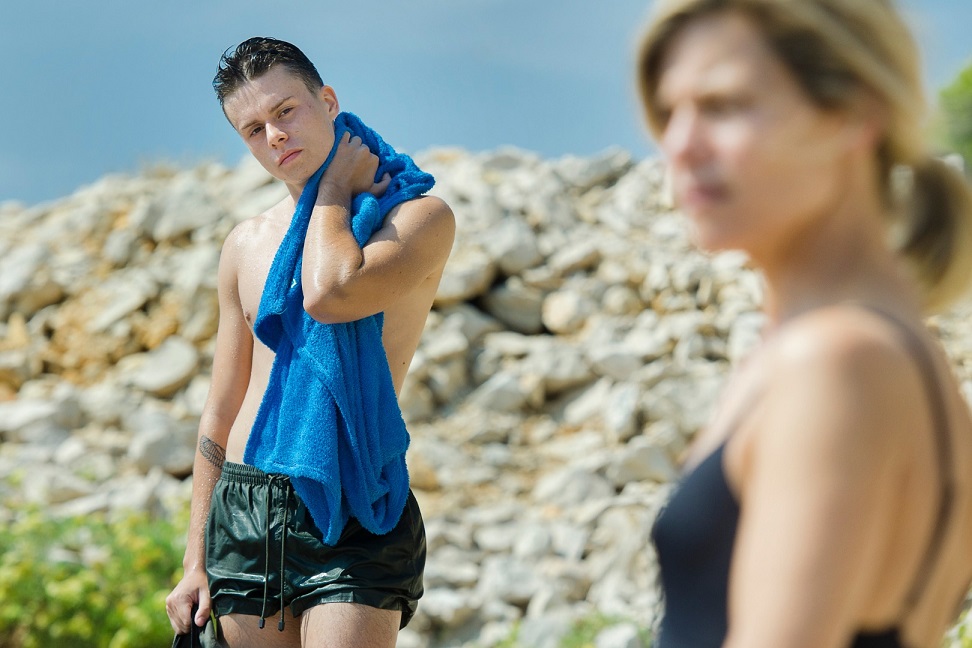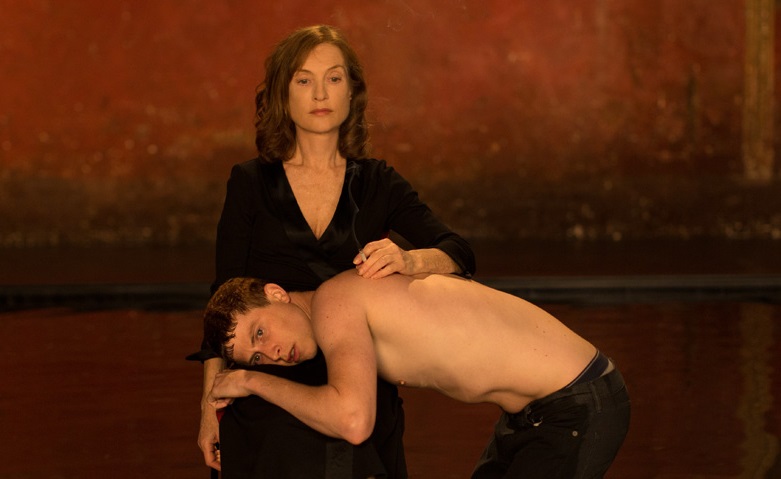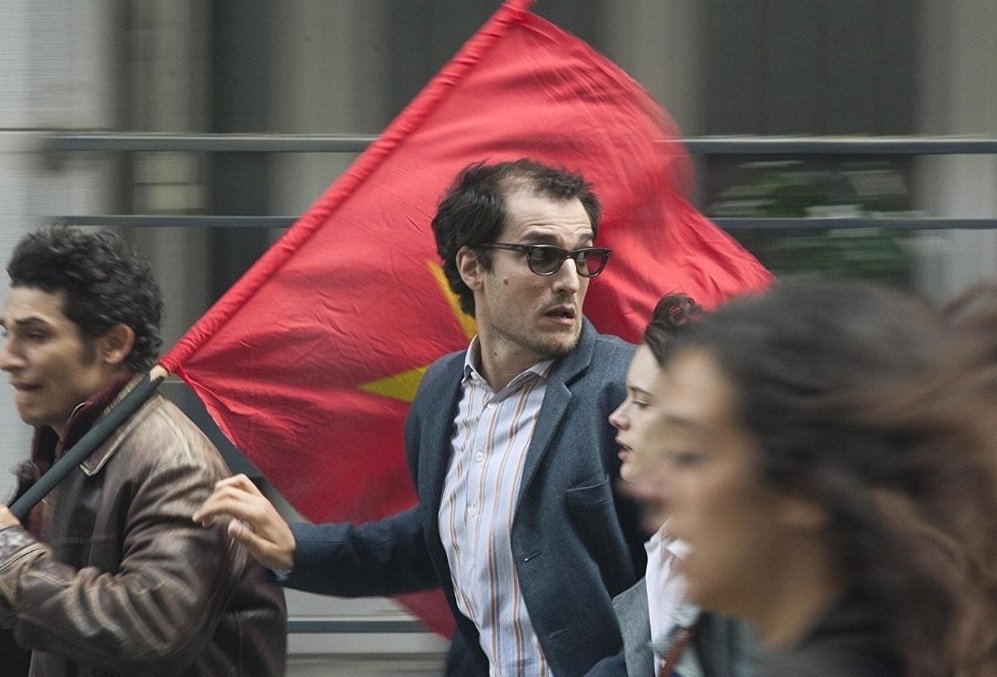On the eve of her tenth decade, the marvellous Agnès Varda embarked on the enchanted journey that we see in Faces Places. For admirers of the great French director – of whom there are a great many: indeed, it is hard not to be won over by her resolutely independent, profoundly humanistic substance and style – its spirit will recall her two earlier documentary films of the century, The Gleaners & I (2000) and the more autobiographical The Beaches of Agnès (2008), though the mélange between personal and social is here complete. This is a journey that celebrates a life richly lived as well as the human interaction, the delight in the sheer richness of humanity, that has always been inseparable from that existence.
The difference from those previous films is that in Faces Places Varda does not travel alone, her companion here the vivacious photographer JR, a half century her junior: she has seen “88 springtimes”, he is 33. (Quite how they met is shrouded in a whimsical series of opening episodes charting how they didn't meet, including an irresistible disco scene with the veteran Varda gamely bopping the dance floor.) JR’s speciality is large-scale photo portraiture, created in the most democratic style possible: he drives a special photo-camion, designed to resemble a camera, complete with photo booth and equipment which produces, directly out of the side of the truck, huge prints for pasting on walls,. Or any other suitable surface, since his speciality (aided by a team of assistants) is plastering his images – which can be anything up to ten times human scale – on anything, from gasometers to train wagons. Portraits in landscape, as never before. It’s their shared interest in their subjects – hardly the right word, when collaboration is so close – that makes this pairing ideal; these are not artists working on their own, but creators of events. “To meet new faces,” is how Varda expresses the resolve behind their road trip, its destinations better caught by the film’s French title, Visages Villages. No big city monotony here, rather an exploration of rural France, its singularities and personalities relished to the full.
It’s their shared interest in their subjects – hardly the right word, when collaboration is so close – that makes this pairing ideal; these are not artists working on their own, but creators of events. “To meet new faces,” is how Varda expresses the resolve behind their road trip, its destinations better caught by the film’s French title, Visages Villages. No big city monotony here, rather an exploration of rural France, its singularities and personalities relished to the full.
Was there a guiding concept behind their journey, as they travel from the declining mining communities of the North to the villages of the South, where a sense of profound permanence seems to reign? Hard to say, when chance (“We enlist it as an assistant!”) so clearly played a role. In each location, JR and his team create small monuments to individuality, putting the sitters in a spotlight that nevertheless seems a natural part of their environment: they range from Jeanine, the last remaining resident in a whole row of miners’ dwellings (pictured above), through portraits of the wives of three Le Havre dockers that are emblazoned, almost 100 meters in height, across the sides of shipping containers, to the collectif of a Provence chemical factory (pictured below, with Varda and JR).
Change is a recurring motif, a level of dehumanisation noted in working life
That last detail brings home that the Varda-JR tandem does not consciously seek out any sort of rustic idyll; modernity is a natural element in these worlds, even if politics remains distant (notwithstanding any reflections we may have that some of the communities visited would surely have voted for Le Pen). And change is a recurring motif, a level of dehumanisation noted in working life: where once whole communities would have brought in the harvest, now a single farmer attends to 2,000 acres on his own, sitting atop a tractor/harvester that is fully controlled by computer.
“What is the subject, actually?” Varda muses at one point. For her, perhaps, it is in the conviction that whatever activity a human being may engage with, it should not dwarf the humanity of the individual(s) involved. Faces Places teaches us quite a lot on matters caprine, including that today’s goats often have their horns removed (burnt away, or “disbudded”, at an early age). That’s ostensibly to reduce damage when they fight, but Varda is affronted: how she rejoices when she finds a smallholder who resists all that, a place where milking by hand rather than machine is seen as the natural process. To treat someone or something as mere “product” is the worst thing of all. By loose extension, art becomes a catalyst that can transform the everyday. Asked by one railwayman why JR has pasted images of Varda’s eyes (and toes, too) onto the sides of chemical-storage train tankers, she replies that it is to endorse the “power of imagination”. We may perhaps wonder whether there is nevertheless an elitist concept involved somewhere, in this conscious idea that “art is for everyone”, especially when promulgated by France’s generous funding regime. But Varda’s film brings home how that can never be the case when everyone is involved (the film’s crowdfunding element is surely as appropriate here as the concept has ever been).
By loose extension, art becomes a catalyst that can transform the everyday. Asked by one railwayman why JR has pasted images of Varda’s eyes (and toes, too) onto the sides of chemical-storage train tankers, she replies that it is to endorse the “power of imagination”. We may perhaps wonder whether there is nevertheless an elitist concept involved somewhere, in this conscious idea that “art is for everyone”, especially when promulgated by France’s generous funding regime. But Varda’s film brings home how that can never be the case when everyone is involved (the film’s crowdfunding element is surely as appropriate here as the concept has ever been).
Faces Places is also a picaresque story of bonding between two individuals, their symbiosis of engagement with those whom they encounter reinforced by the gentlest of teasing. Both look with such curiosity at the world around them, that issue of vision associated both with Agnès’s failing sight and JR’s reluctance to take off his dark glasses. That latter strand harks back naturally to Varda’s 1961 burlesque film-within-a-film, Méfiez-vous des lunettes noires (Beware of dark glasses), in which Jean-Luc Godard, no less, starred with a Keatonesque charm, a quality singularly lacking in his behaviour in the final scene of Faces Places. It proves a rare moment of sadness in a work where these two presences, perfectly accompanied by Matthieu Chedid’s string score, are so entrancingly life-affirming. If ever a film could promise you une bonne journée, it’s Faces Places.
Overleaf: watch the preview for Faces Places

 That’s certainly where it departs from The Class, though Cantet’s new film certainly develops his earlier concept that exploring ideas – as envisaged in the group’s shared development of its story – can be as engrossing as any more traditional sense of encounter. Even here, that potential never vanishes entirely: Antoine’s final appearance among his fellows has him delivering a stunning verbal assault every bit as lacerating as any other more direct attack could be.
That’s certainly where it departs from The Class, though Cantet’s new film certainly develops his earlier concept that exploring ideas – as envisaged in the group’s shared development of its story – can be as engrossing as any more traditional sense of encounter. Even here, that potential never vanishes entirely: Antoine’s final appearance among his fellows has him delivering a stunning verbal assault every bit as lacerating as any other more direct attack could be.  Fontaine has filled in that gap by positing an imagined concept that the Louis figure, here named Marvin Bijou – the awkwardness of that surname, translated as “Jewels”, seems horribly ironic for a context that is anything but sparkling – found his path out of that desolate early milieu through theatre. Early encouragement from a sympathetic schoolteacher is fortuitously followed by engagement with an intuitive stage director-coach, who draws Marvin both out of himself and into the Parisian gay scene. Never entirely losing his shyness, his involvement in that culture grows, encouraged by a largely benevolent sugar daddy figure who moves in circles of which the youth could once barely have dreamed.
Fontaine has filled in that gap by positing an imagined concept that the Louis figure, here named Marvin Bijou – the awkwardness of that surname, translated as “Jewels”, seems horribly ironic for a context that is anything but sparkling – found his path out of that desolate early milieu through theatre. Early encouragement from a sympathetic schoolteacher is fortuitously followed by engagement with an intuitive stage director-coach, who draws Marvin both out of himself and into the Parisian gay scene. Never entirely losing his shyness, his involvement in that culture grows, encouraged by a largely benevolent sugar daddy figure who moves in circles of which the youth could once barely have dreamed. It’s their shared interest in their subjects – hardly the right word, when collaboration is so close – that makes this pairing ideal; these are not artists working on their own, but creators of events. “To meet new faces,” is how Varda expresses the resolve behind their road trip, its destinations better caught by the film’s French title, Visages Villages. No big city monotony here, rather an exploration of rural France, its singularities and personalities relished to the full.
It’s their shared interest in their subjects – hardly the right word, when collaboration is so close – that makes this pairing ideal; these are not artists working on their own, but creators of events. “To meet new faces,” is how Varda expresses the resolve behind their road trip, its destinations better caught by the film’s French title, Visages Villages. No big city monotony here, rather an exploration of rural France, its singularities and personalities relished to the full. By loose extension, art becomes a catalyst that can transform the everyday. Asked by one railwayman why JR has pasted images of Varda’s eyes (and toes, too) onto the sides of chemical-storage train tankers, she replies that it is to endorse the “power of imagination”. We may perhaps wonder whether there is nevertheless an elitist concept involved somewhere, in this conscious idea that “art is for everyone”, especially when promulgated by France’s generous funding regime. But Varda’s film brings home how that can never be the case when everyone is involved (the film’s crowdfunding element is surely as appropriate here as the concept has ever been).
By loose extension, art becomes a catalyst that can transform the everyday. Asked by one railwayman why JR has pasted images of Varda’s eyes (and toes, too) onto the sides of chemical-storage train tankers, she replies that it is to endorse the “power of imagination”. We may perhaps wonder whether there is nevertheless an elitist concept involved somewhere, in this conscious idea that “art is for everyone”, especially when promulgated by France’s generous funding regime. But Varda’s film brings home how that can never be the case when everyone is involved (the film’s crowdfunding element is surely as appropriate here as the concept has ever been). These are big set pieces that are beautifully recreated here. Godard's presence at the street protests is ironically marked by the recurring joke of how he breaks his glasses over and over again in the demonstrations (a nice late line in Stacy Martin’s voice-over suggests that it was the rising optician costs that finally stopped him joining them). More significantly, he was rejected by the student protestors, not least for arguing, in relation to Palestine, that the “Jews are the new Nazis” (plus ça change...). Intent on changing his creative direction, Godard was flummoxed by people coming up to him to ask why he wasn’t making movies like Breathless anymore (even a policeman, after a fracas, confesses how much he loved Contempt).
These are big set pieces that are beautifully recreated here. Godard's presence at the street protests is ironically marked by the recurring joke of how he breaks his glasses over and over again in the demonstrations (a nice late line in Stacy Martin’s voice-over suggests that it was the rising optician costs that finally stopped him joining them). More significantly, he was rejected by the student protestors, not least for arguing, in relation to Palestine, that the “Jews are the new Nazis” (plus ça change...). Intent on changing his creative direction, Godard was flummoxed by people coming up to him to ask why he wasn’t making movies like Breathless anymore (even a policeman, after a fracas, confesses how much he loved Contempt).